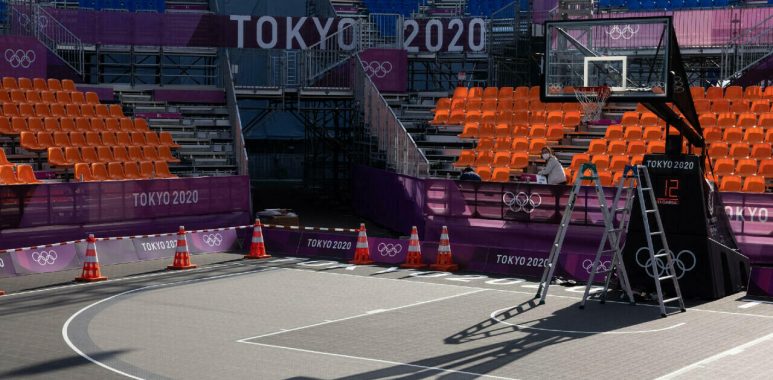
To Play or Not To Play…..That is the Question
For the 2020 Tokyo Olympics, Africa’s representative for the basketball competition are four time Afrobasket champions Nigeria. The D’Tigress, as they are fondly referred to as, have been Africa’s most dominant women’s side over the past few years, winning back to back Afrobasket tournaments in 2017 and 2019. In addition, the D’Tigress have not lost a competitive fixture in Africa since 2015. For their second Olympic participation after their maiden appearance at the 2004 games in Athens, Nigeria will unfortunately have to play without Afrobasket 2019 MVP, Evelyn Akhator, who will miss the Tokyo games due to an injury. As a result, much of the scoring and leadership duties will fall on France-based star Ezinne Kalu. In a perfect world, Kalu wouldn’t have to shoulder these responsibilities, as D’Tigress head coach Otis HIghley, named Nneka and Chiney Ogwumike, alongside Elizabeth Williams to Nigeria’s preliminary Olympic squad. The addition of the Ogwumike’s, who are siblings and both play for the Los Angeles Sparks of the WNBA, as well as Williams, who is on the WNBA’s Atlanta Dream franchise, elicited both excitement and surprise.
Nneka was a 2016 WNBA champion and MVP, while Chiney, the number one overall pick in the 2014 WNBA draft, has been one of the league’s most solid and recognizable players, averaging 13 points per game and 7.1 rebounds per game during her four year career. Williams was the WNBA Most Improved Player in 2016, an All-Star in 2017 and is regarded as one of the best defenders in the league. The inclusion of this trio of high profile players on the Nigerian squad would have catapulted Nigeria to the status of a potential Olympic medal contender. However, the surprise element emanated from the fact that, the aforementioned players have each played for the United States women’s national team at various stages of their career. While Williams and Chiney had experience with USA junior national team outfits, Nneka has had a more robust involvement, winning the 2014 and 2018 FIBA Basketball World Cup with Team USA senior team as well as being MVP of the 2020 Olympic Qualifying Tournament, which secured the US participation for Tokyo 2020.
Basketball’s global governing body FIBA, does not permit players to switch national team representation from one senior team to another. Nevertheless, FIBA does give the institutions secretary general the authority to allow a player to compete for his or her country of origin; “if this is in the interest of the development of basketball”. Despite their pleas to this end, Nneka and Williams saw their appeals to represent Nigeria denied, due to their extensive past involvement with USA Basketball, while Chiney was permitted suit up for Nigeria, but as a naturalized player. The FIBA decision was a major blow, as both Nneka and Williams had secured authorization from USA Basketball to make the proposed switch. The FIBA decision was a double blow for Nneka, as her desire to play for Nigeria was largely motivated by her non-selection for the US Olympic squad. This was despite Nneka being one of 8 US players who signed a contract to commit to national team duty for the 2019-2020 timeframe. The decision also made her the first WNBA player not represent Team USA at an Olympics games.
Kimathi Toboti, head coach of the University of Pretoria women’s basketball team, who previously served the South African female national team coach, believes FIBA took the right decision, stating that, ”it was simply applied the relevant rules and statues, which should not be changed to suit the wishes of a few individuals”. Toboti also argued that, in the case of Nneka, her ambition to play for Nigeria was due to her non-selection by Team USA, rather than a desire to contribute to the advancement of Nigerian basketball. Toboti further suggested that, there would have been more compassion from FIBA, if she had applied to play for Nigeria during the previous World Cup or prior at Afrobasket competitions. Nevertheless, Toboti expressed sympathy for the players concerned, acknowledging that, the decision to represent Team USA occurred when they were young and at in their respective careers when it was the best to take such a decision. He added that, as a basketball fan, the authorization of the concerned players would have made Nigeria’s participation more interesting and could have a positive impact on the team in the short run.
Toboti’s point regarding the positive impact national team switches could have for the player receiving teams are undeniable. However, if FIBA approved such a requests, This could possibly trigger a wave of player movement, which could potentially see some high profile players make a switch.
| Player | Current national team | Potential national team |
| Satou Sabally | Germany | The Gambia |
| Anyike Ogunbowale | USA | Nigeria |
| Eziyoda “Ezi” Magbegor | Australia | Nigeria |
| Liz Cambage | Australia | Nigeria |
| Awak Kuier | Finland | South Sudan |
| Astou Ndour | Spain | Senegal |
Regardless, many observers have equated the request by the Ogwumike’s and Williams to represent Nigeria, as sheer opportunism. However, public opinion has largely failed to interrogate the circumstances which motivate players from the African diaspora to choose to represent their countries of residence over their countries of origin. This author grew up in the US at the same time as Williams and the Ogwumike sisters and navigating the duality of living in American society but being raised in an African household comes with a multitude of complexities. As an African, one is always reminded about their heritage, yet, the desire to assimilate into and socialize with the dominant culture, is also a prime objective. National team representation is an example of this assimilation and achieving this with countries like the US and in Europe, can afford access to life changing socio-economic opportunities such as; endorsements, sponsorship, scholarships and even citizenship. In many instances, particularly for African countries, these same opportunities are not readily available for persons who decide to represent their national teams or do not provide benefits on the same scale as in the aforementioned environments. Furthermore, in several instances, issues related to poor organization as well as non-participation of national teams at international competitions also serve as deterrents to suit up for African sides.
In an interview with ESPN, Nneka acknowledged the criticism that, she only showed interest in the D’Tigress, after the Team USA snub. Regardless, of the situation at hand, Nneka remains optimistic about the potential of being part of the Nigerian team, alongside Chiney and their youngest sibling Erica, who is currently with D’Tigress in Tokyo, in the event they qualify for the 2024 Olympics in Paris. To this end, Nneka has lodged an appeal of the FIBA decision at the Court of Arbitration in Sports (CAS). The African basketball landscape has derived an increasing amount of attention over the years, with FIBA organizing more competitions and federations on the continent becoming more organized in recent years. These bodies in collaboration with sports ministries and private sector actors need to take steps to make playing for African national teams attractive enough for the most talented players in the diaspora to be desirous at the expense of the countries they have called home. For the sake of growing interest in the game, FIBA should also emulate the actions of soccer’s global governing body FIFA, which over the last 20 years, has made nationality switch rules less stringent, a development which has significantly benefitted African countries.
